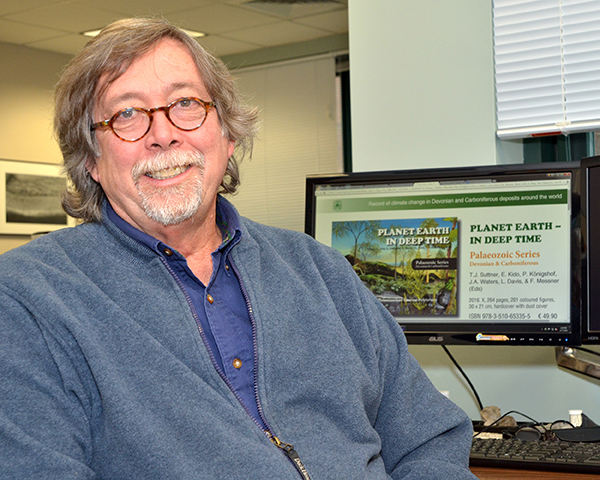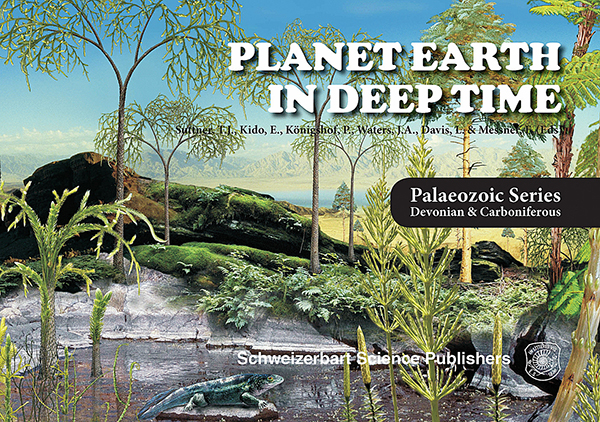BOONE—A five-year UNESCO and International Union of Geological Sciences project on the interaction between climate change and the earth’s biodiversity, IGCP 596, has culminated in the book “Planet Earth – In Deep Time,” co-edited by Professor Johnny Waters at Appalachian State University.
The 261-page book published by Schweizerbart science publishers in Stuttgart, German, also was co-edited by Appalachian alumna Laura Winstead Davis, who is a free-lance book editor.
The book, written for a general audience, high-lights key geographic areas of the Devonian and Carboniferous Periods that occurred 419 – 299 million years ago, from Australia, Bulgaria and Mongolia to the Ukraine and Vietnam. The book includes English text and text written in each chapter’s respective national language for each country featured in the book. More than 114 scientists from more than 30 countries were part of the UNESCO study and contributed to the book, including Waters.
Waters, a member of Appalachian’s Department of Geology faculty, along with fellow faculty member Sarah Carmichael and undergraduate student Cameron Batchelor were part of the five-year project, conducting field work in Mongolia and lab work on rocks from China, German and Vietnam, in addition to Mongolia.
“The project has added an enormous amount to the synthesis of the Devonian world,” Waters said of the international research effort. “This project had a focus on climate change and for the first time, we can show the Devonian is an analog to modern climate change because it was a time of very rapid change in carbon dioxide levels and rapid change in the ecosystem.”
Waters explained that the earth’s first large-scale forests were removing carbon dioxide (CO2) from the atmosphere at a very rapid rate. “Today we are facing a very rapid increase in CO2 resulting in rapid changes in the climate. In the Devonian, CO2 levels were dropping rapidly causing a major change in the climate. It’s the rate of change that causes the biotic crisis. I think that climate change and its analogy to the Devonian was something that wasn’t on the radar before, and now it is.”
Overall, the project has resulted in nearly 200 peer reviewed publications as well as an additional book publication, he added. In addition, the book has been paired with a documentary film and is being nominated for a German National Science Foundation Communicator Award.
“UNESCO and IUGS-funded projects are designed to sponsor relationships between First- and Third-World scientists,” Waters said. “As a part of the project, your success is measured by peer-reviewed publications and a global outreach component.”
That’s how the idea for “Planet Earth – In Deep Time” grew. “We got the idea to publish a picture book on what the geology of this time interval looked like around the world and include short contributions in the native language of each country with a translation into English,” Waters said. “We ended up with 26 different languages represented in the book.”
While English is considered the “language of science,” Waters said, including passages in a country’s native language opens the research to a multitude of readers and shows that “geology really doesn’t have national boundaries. And we wanted people to be able to read brief discussions of the geology in their own country in the context of their own language.”
The Devonian period is known for its rich deposits of oil and gas, as well as fossils that contain clues to the earth’s past climate, according to publicity for the book. The record of climate change preserved in them is the best, and only, resource of information on the Earth’s climate system then, at a time when current and future climatic change is one of society`s greatest challenges, the publishers wrote.
Working on the book provided Waters new insights into the global significance of the Devonian period on world events.
“While controversial, a lot of the new sources of oil and gas in the U.S. come out of the Devonian,” Waters said. “One of the things I never realized was how important the Devonian was globally to the production of oil and gas.”
For instance, it was rich deposits of oil and gas from the Devonian period in Siberia that fueled the Russian armies during World War II, Waters learned.
“People across the world are concerned about rapid change in CO2 in the modern world and the implications for instability for climates and life on the planet,” Waters said. “But there is also uncertainty because most of the changes lie in the future. Geology removes that uncertainty by showing us what happened in the past during these times of rapid change in CO2. That, I think, will be an important legacy of this project.”
About Appalachian State University
As a premier public institution, Appalachian State University prepares students to lead purposeful lives. App State is one of 17 campuses in the University of North Carolina System, with a national reputation for innovative teaching and opening access to a high-quality, cost-effective education. The university enrolls more than 21,000 students, has a low student-to-faculty ratio and offers more than 150 undergraduate and 80 graduate majors at its Boone and Hickory campuses and through App State Online. Learn more at https://www.appstate.edu.
What do you think?
Share your feedback on this story.




![How NCInnovation Is Rethinking Economic Development in North Carolina [faculty featured]](/_images/_posts/2026/02/rethinking-economic-development-600x400.jpg)








